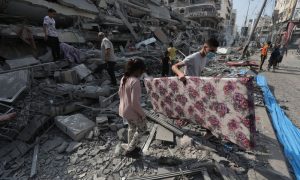As the political landscape in the capital undergoes its final transformation, there is trouble brewing in the country’s northwest region as different terrorist groups start to merge. As this trend picks up, the new government’s efforts to achieve political stability, economic recovery, and effective governance will be threatened. It has very little time to create and implement a cohesive plan to combat this threat.
Khyber Pakhtunkhwa and neighboring Balochistan and Punjab were plagued by terrorist violence throughout 2023. Approximately 1,500 terrorism-related deaths were reported in 2023, making it the bloodiest year in recent memory. Lately, two brave police officers, SP Ijaz Khan and Constable Qaiser, were martyred in action as they confronted the notorious terrorists Mohsin Qadir and Essa of the Tehreek-i-Taliban Pakistan (TTP) in Mardan’s Zada Mata area. As they take office, the new governments must ensure that this grim trend is not allowed to continue in the coming year.
But distressing reports indicate that the volatile landscape of Pakistani militant groups is undergoing a seismic shift. Rumors are rife about Hafiz Gul Bahadur’s faction merging with the TTP leadership led by Mufti Noor Wali Mehsud, already aligned with Tehreek-e-Lashkar-e-Islam. The latest significant development within the TTP hierarchy is Hafiz Gul Bahadur potentially assuming the second-in-command role.
Notorious for its ability to attract and mobilize young recruits, the TTP stands to bolster its ranks further with this merger. Masuds, renowned for their adept organization of extortion networks but lacking in conscription capabilities, are expected to benefit substantially from this alliance. Speculation arises whether these maneuvers are reminiscent of pre-2014 power dynamics within the regions.
Wazir-dominated HGB and Masud-dominated TTP otherwise traditional rivals, dwelling in North and South Waziristan in the order, with this historically strong alliance may well heat up simmering tensions. With the TTP poised to exert even greater influence, a troubling era fraught with new and formidable security dilemmas looms.
The prospect of coordinated attacks in the region has been raised. There is a possibility that both North and South Waziristan will experience serious security problems, including the influx of militants, which will have spillover effects for neighboring areas like Bannu, Swat, DI Khan, and Peshawar. Adding to these concerns is the apprehension that the new government may take a “soft” approach to these threats.
It is noteworthy though that the HGB, TTP, JUI, and LI have similar characteristics They are mercenary outfits that provide services such as extortion and killing to the highest bidders. Nevertheless, the TTP is also ambitious: it aims to unite different religious militant factions opposing the government in order to achieve its strategic objectives. Many have argued that its progress in this area is a result of the state’s weakening authority, which is concerning.
Initially, it has prioritized attacks on police over attacks on assets critical to national security. As the state’s capacity to enforce the law is gradually eroded, this puts the country at risk of an eventual showdown between the extremists and the military.
It is unfortunate that a number of incidents have been underreported as a result of a media blackout on reporting terrorist activity. Although this approach may provide some temporary relief, it will ultimately hinder a cohesive national response. Every person must contribute to a war effort, which is essentially what we are facing right now. It is important to see the entire community taking action.
Despite efforts to engage in ceasefire talks and peace negotiations, distrust between the Pakistan and the TTP persists. Low-scale skirmishes continue, triggered by leadership changes and the emergence of other like-minded groups. And, while attempts have been made to manage the TTP, the bigger challenge of addressing the root causes of extremism and violence in the region remains largely unaddressed.
As discussions continue, policymakers must remain on top of the evolving landscape and address the underlying grievances that drive militant activities. A majority of people engage in violent behavior because of unemployment, their attraction to easy means of enrichment, or because they think it confers an aura of machismo upon them. The potential of more mergers between TTP factions amidst other ongoing security challenges underscores the complex dynamics of extremism in Pakistan.
Primarily the challenge for the federal government is two-tiered: to secure Pakistan and ensure no part of the country is available for terrorist outfits to establish themselves and to prevent militants from creating sanctuaries in Afghanistan. The new government, together with the security establishment and provincial set-ups, must hammer out a failsafe plan to secure the country, particularly those parts of KP and Balochistan that have been suffering from frequent terrorist attacks.
The basic response structure exists in the form of the National Action Plan. Though the key is to update it as per the requirements of the day and implement it. Furthermore, dealing with militancy should be made a one-window operation, preferably led by local police and administrations and inputs from NACTA and support from all stakeholders.
With regard to improving capacity, it is important to understand that the integration of Khasadars into the police force NMD has proven counterproductive as they lack qualifications and proper training. Instead, youth from tribal areas who meet police recruitment standards should be inducted into the force. It is also widely believed that the heavy presence of armed forces in the newly merged districts (NMDs) hinders independent policing.
Incentives for DPOs in NMDs, like the one recently given to Balochistan, would motivate them to work there. Makeshift arrangements must be replaced with permanent police facilities so that effective law enforcement can be ensured. The security forces should meanwhile dedicate all their energies to eliminating the terrorist threat and protecting the lives of civil and military personnel on the frontlines.
Engagement should continue with those who lay down arms, and diplomacy with the Afghans should continue over the removal of any local sanctuaries. There is also a pressing need for better border management, ending systematic corruption, restoring local confidence, and prohibiting the cultivation of ‘assets’. Unless the new dispensation in Islamabad tackles terrorism head-on, economic stability and social cohesion will remain elusive.























